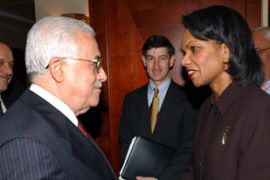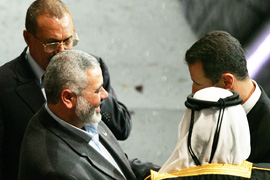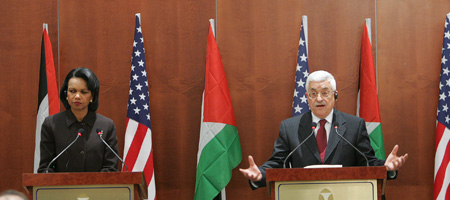Abbas ready to take ‘next step’
Palestinian president says talks between Hamas and Fatah have “reached a dead end”.

Meanwhile Ismail Haniya, the prime minister, is on a diplomatic tour making a similar assessment of his counterparts in the Arab world.
If Fatah decides to take a unilateral step while Hamas is calling for continued negotiations and the prime minister is abroad, Hamas supporters, estimated as high as 40 per cent of the population, could be alienated from the political process.
Unplanned visit
Rice congratulated Abbas for reaching an agreement with the Israeli prime minister, Ehud Olmert, for a ceasefire in the Gaza Strip after months of brutal violence.
The five month-long series of Israeli military incursions into Gaza and regular shelling claimed the lives of more than 457 people, a quarter of them children, and injured well over 1,000, according to the Palestinian Authority health ministry.
Rice’s unplanned visit – she was already in Amman for George Bush’s meeting with the Iraqi prime minister, Nuri al-Maliki – was prompted by the cessation of violence and is aimed at trying to revive the peace process.
 |
| Haniya is on a diplomatic tour of Arab states |
Olmert suggested Israel would be willing to leave most of the West Bank in exchange for “real peace” in a speech earlier this week.
Speaking about the formation of a unity government, Abbas said “The goal is to break the siege”.
Rice in turn described Abbas as a partner, yet many Palestinians no longer view the US as such, but instead as being motivated by the desire of regime change after Hamas rejected the conditions of the international Quartet (the EU, US, the UN and Russia).
Those conditions include renouncing armed resistance, recognising Israel, and respecting all previous agreements struck between parties to the Israeli- Palestinian conflict.
Economic woe
The US treasury department banned all financial transactions with the Palestinian Authority after the Hamas-led government was sworn into office at the end of March, prohibiting the government from receiving funds from abroad.
Government employees have gone unpaid for nine months, while the economy has been devastated.
Hamas’s position has shifted since then. A ceasefire is in place and the next prime minister, recently selected, will only speak for the national government and will not necessarily express the official position of Hamas.
“This will allow the president to start the peace process with Israel and to negotiate. Hamas will not place obstacles in the political way of president Abbas,” Haniya said.
|
“Hamas will not place obstacles in the political way of president Abbas” Ismail Haniya, Palestinian Prime Minister |
Hamas has not agreed to relinquish control of the finance and interior ministries, according to spokesperson Abu Rudeineh, arguing these ministries require leadership that can travel and can deal with the international community.
Hamas fears high-level corruption and that the security forces could become unwieldy under an independent minister.
“Hamas asserted its respect for previously singed agreements,” said Haniya. “The problem is that Israel refuses to respect these agreements and disregards them, instead implementing their own policies that reinforce the Israeli occupation on the ground.”
Rice brokered the “Agreement on Movement and Access” herself last November in Jerusalem.
‘Access issues’
Gaza’s commercial and passenger border crossings were supposed to be open continuously under the agreement but were mostly closed even before the Hamas-led government was sworn into office, and the agreed-upon connection between the West Bank and Gaza was never implemented by Israel.
“There are some specific issues that with the Egyptians we jointly, of course, are very responsible for the movement and access issues and we will talk about those with the Egyptians,” Rice said in Jericho.
Abbas’s office declined to comment whether the US had offered to strengthen the president’s position via monetary or military support.
Reuters reported this week that Lieutenant-General Keith Dayton, the US security co-ordinator in the region, will ask the US Congress for funds to bolster security forces loyal to Abbas and to improve the security infrastructure at Karni (Gaza’s only commercial crossing).
Palestinian politicians claim financial support from the US for Fatah and
Abbas’s presidential guard is increasing Hamas’s popularity.
“Palestinians understand America is supporting Fatah with money and at the same time preventing Hamas from receiving money. It makes Hamas look more nationalist and clean and Fatah look like a puppet for the Americans,” Suffian Abu Zayda, a senior Fatah leader in Gaza, said.
Unity hope
Rice said the US has played an active role in providing humanitarian support via non-governmental organisations.
Life-saving assistance such as fuel and medical supplies, unable to reach Gaza due to Israeli border closers and strict economic sanctions, are still being provided by the European Union’s temporary international mechanism (TIM).
The PA deployed security forces along Gaza’s perimeter on Sunday, as Preventative Security Service forces and intelligence were increased inside the strip to prevent violations of the ceasefire.
“The agreement to stop firing rockets was agreed upon in the presence of all Palestinian factions,” a senior commander of the Hamas Executive Force said, speaking on condition of anonymity.
“The [executive] force will work to stop the launching of rockets, by all factions, as part of the security apparatus.”
Palestinians were counting on a unity government to resuscitate the peace process and to break the siege.
They may hold Fatah accountable for any failure should they be first to leave the negotiating table, and an already fragile ceasefire in Gaza is likely to collapse if internal strife breaks out between factions.
 |
| Abbas declined to comment if the US intended to strengthen his position via monetary or military support |